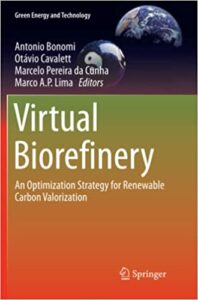
Affiliations:
¹Technology Laboratory, Brazilian Bioethanol Science and Technology Laboratory, São Paulo, Brazil
²University of Campinas, Campinas, Institute of Economics, São Paulo, Brazil
³University of Campinas, Campinas, Institute of Physics Gleb Wataghin, São Paulo, Brazil
DOI: 10.1007/978-3-319-26045-7
Comments:
This book describes a framework for assessing impacts of existing biorefineries and provides a possible road map for development of novel biorefineries. Chapters explore the main issues regarding biorefinery assessment, including feedstock production and transportation modeling, biofuels and green chemistry products, as well as assessment of sustainability impacts.
In Chapter 4, the authors (Edvaldo R. Morais, Tassia L. Junqueira, Isabelle L. M. Sampaio, Marina O. S. Dias, Mylene C. A. F. Rezende, Charles D. F. de Jesus et al.) describe Biorefinery Alternatives. The authors dedicate a sub-section (4.4) to list available process simulation tools and address interfacing standard in section 4.4.5.
The authors recognize CAPE-OPEN as the de-facto standard for interfacing process modeling software. They go on citing two major software applications developed in South America: DWSIM as a CAPE-OPEN compliant process simulator and EMSO as a CAPE-OPEN compliant equation-oriented process simulator.
